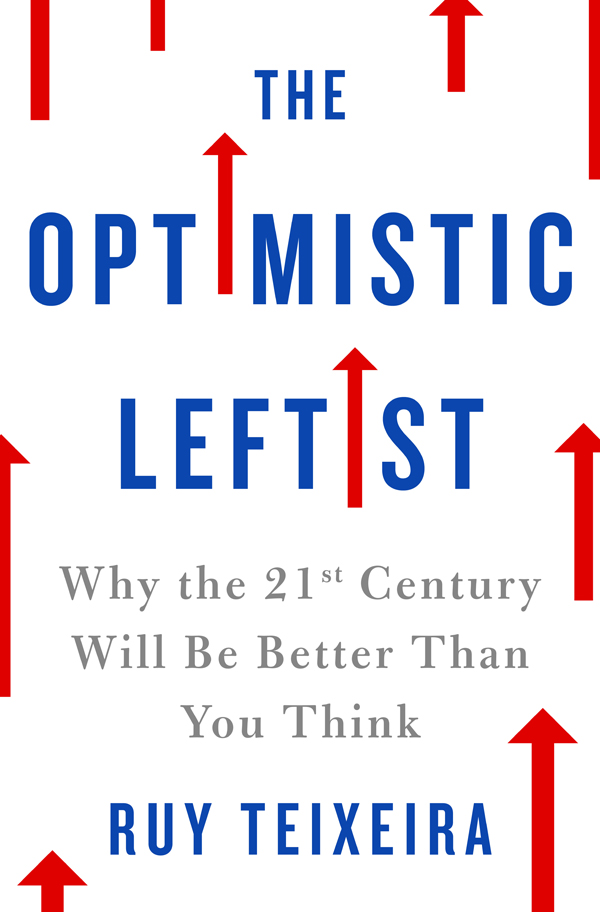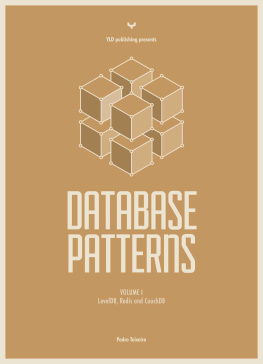Ruy Teixeira - The Optimistic Leftist: Why the 21st Century Will Be Better Than You Think
Here you can read online Ruy Teixeira - The Optimistic Leftist: Why the 21st Century Will Be Better Than You Think full text of the book (entire story) in english for free. Download pdf and epub, get meaning, cover and reviews about this ebook. year: 2017, publisher: St. Martin’s Press, genre: Politics. Description of the work, (preface) as well as reviews are available. Best literature library LitArk.com created for fans of good reading and offers a wide selection of genres:
Romance novel
Science fiction
Adventure
Detective
Science
History
Home and family
Prose
Art
Politics
Computer
Non-fiction
Religion
Business
Children
Humor
Choose a favorite category and find really read worthwhile books. Enjoy immersion in the world of imagination, feel the emotions of the characters or learn something new for yourself, make an fascinating discovery.

- Book:The Optimistic Leftist: Why the 21st Century Will Be Better Than You Think
- Author:
- Publisher:St. Martin’s Press
- Genre:
- Year:2017
- Rating:5 / 5
- Favourites:Add to favourites
- Your mark:
- 100
- 1
- 2
- 3
- 4
- 5
The Optimistic Leftist: Why the 21st Century Will Be Better Than You Think: summary, description and annotation
We offer to read an annotation, description, summary or preface (depends on what the author of the book "The Optimistic Leftist: Why the 21st Century Will Be Better Than You Think" wrote himself). If you haven't found the necessary information about the book — write in the comments, we will try to find it.
Ruy Teixeira: author's other books
Who wrote The Optimistic Leftist: Why the 21st Century Will Be Better Than You Think? Find out the surname, the name of the author of the book and a list of all author's works by series.
The Optimistic Leftist: Why the 21st Century Will Be Better Than You Think — read online for free the complete book (whole text) full work
Below is the text of the book, divided by pages. System saving the place of the last page read, allows you to conveniently read the book "The Optimistic Leftist: Why the 21st Century Will Be Better Than You Think" online for free, without having to search again every time where you left off. Put a bookmark, and you can go to the page where you finished reading at any time.
Font size:
Interval:
Bookmark:


The author and publisher have provided this e-book to you for your personal use only. You may not make this e-book publicly available in any way. Copyright infringement is against the law. If you believe the copy of this e-book you are reading infringes on the authors copyright, please notify the publisher at: us.macmillanusa.com/piracy.
For the broad left and the struggle for a better future. Oh, and by the way, cheer up!
On November 8, 2016, Donald Trump was elected president of the United States. To say this was a shock to the political system is a considerable understatement.
It has never been more important to take a long view of the lefts future and not dwell on short-term setbacks. A key effect of Trumps election is the beginning of the end for austerity economics, formerly the linchpin of conservative policy. Trumps professed commitment to massive spending on infrastructure and his ostentatious lack of interest in deficit reduction is blowing a hole in austerity dogma that should be welcomed by the left. The decline in that dogma will finally make it possible to break out of the low growth trap that has bedeviled the United States and other advanced countries.
Over time, this development will make all the priorities of the left much easier to move forward. The right will continue to be divided between proponents and opponents of austerity, while the left will unite around policies that promote more and better economic growth. But to succeed the left must proceed with confidence and, yes, optimism.
Granted, the words optimism and the left do not seem to go together very well these days. The dominant view on the leftreinforced by Trumps victoryis as follows: (1) progress in todays world has largely stopped and in many ways reversed; (2) the left is weak and at the mercy of a rapacious capitalism and a marauding right; and (3) the outlook for the future is bleak, with ordinary citizens suffering even more deprivation and the planet itself sliding inexorably toward catastrophe.
Over the years I have argued formally and informally against each of these propositions. It is not the case that progress has stopped. Today, we live in a freer, more democratic, less violent and more prosperous world than we ever have before.
It is not the case that the left is at the mercy of the right. The form of the left is changing but its numbers are strong and growing. It remains a vital force the vital forcefor reforming capitalism.
And it is not the case that the future of humanity is bleak. The problems we face today are solvable and, moreover, are likely to be solved in the coming decades. Life for ordinary citizens should improve dramatically over the course of the twenty-first century.
Making the case against these pessimistic propositions would be a good enough reason to write this book. But there is an additional reason that motivates me. It is the staggeringly obviousat least to mefact that pessimism dramatically undermines the appeal of the left. Why on earth would anyone sign up with a movement that believes the situation is so hopeless? Whats so inspiring about that?
Nothing. Yet the left persists in promoting a viewpoint that leads to paralysis and inaction rather than robust action and positive change.
The left wasnt always like this. Historically, the left has been identified with a belief in the future and the feasibility of dramatic improvements in human welfare. That is how I saw it when I was growing up in the 1950s and 1960s and I was happy to join.
But something went wrong in the 1970s. The great hopes of the 1960s went aground on the harsh realities of stagflation and then rising inequality and a resurgent right. It was indisputable that progress in important ways was slowing down rather than speeding up as most on the left had hoped.
Various significant electoral defeats for the left followedmost famously the rise of Reagan in America and Thatcher in the UK. And anti-government ideology thrived, both in politics and economics. The idea that government was the problem, not the solution, gained political credibility that would have seemed unimaginable in previous decades, and economics became dominated by theories that glorified the results of the untrammeled market.
If that wasnt bad enough, new threats like global warming emerged that cast doubt on the future of humanity writ large. Scientific progress, which once spurred visions of flying cars and lives of abundance and leisure, now seemed powerless to stop the apocalypse (if not complicit in bringing it on).
On the left, optimism went out of fashion, where it has remained to this day. Instead, the left concentrated on reminding voters just how terrible things were becoming. And there was certainly a lot of plausible material along these lines, as Western capitalism continued to underperform in terms of both growth and the distribution of benefits from growth. Data has accumulated over time documenting this poor performanceparticularly in the early twenty-first century and in the aftermath of the Great Financial Crisisand has been duly promulgated by the left.
Even the great victories of the left in the social realm tended to get lost in this litany of despair. Not to mention concrete policy victories such as those secured by President Obama. In short, when the left was winning, it often acted as if it was losing. Not surprisingly, the desired surge in left support has not materialized.
It is time to recognize that pessimism convinces no one. Marx was wrong about the immiseration of the proletariat, and contemporary leftists are wrong about the immiseration of the middle class. What is correct is that progress has slowed down, not that it has stopped or reversed. What is correct is that people want to move up from their current life, not that they believe there is nothing good about their current life. What is correct is that pessimism makes people less likely to believe in positive change, not more likely.
Finally, what is correct is that the best tonic for the left will be the return of solid and better-distributed economic growth, not just the continuing documentation of our current poor performance. Such growth is eminently possible even without a political revolution. Good economic times will promote upward mobility and a sense of personal optimism. That optimism, in turn, will promote a climate of social generosity, tolerance and orientation toward collective advance that will greatly facilitate the agenda of the broad left.
That has been generally true throughout history and recent history indicates that it is still true today. It is time for the left to realize that its romance with pessimism is a bug not a feature of its current practice. There are no substitutes for optimism and an economic climate that promotes optimism. This seemingly simple but overlooked truth is why I wrote this book.
The left is likely to dominate the twenty-first century and there is little the right can do about this except adapt. This seems counter-intuitive in light of the modest success the left has enjoyed since the Great Financial Crisis of 200809. Even in the United States, where Democrats held the presidency under Barack Obama for eight years, progressives have had difficulty moving their policies forward, suffering instead through an endless series of political battles with a determined and extreme Republican Party. This situation has only been exacerbated by the stunning election of Donald Trump to the presidency in 2016.
Font size:
Interval:
Bookmark:
Similar books «The Optimistic Leftist: Why the 21st Century Will Be Better Than You Think»
Look at similar books to The Optimistic Leftist: Why the 21st Century Will Be Better Than You Think. We have selected literature similar in name and meaning in the hope of providing readers with more options to find new, interesting, not yet read works.
Discussion, reviews of the book The Optimistic Leftist: Why the 21st Century Will Be Better Than You Think and just readers' own opinions. Leave your comments, write what you think about the work, its meaning or the main characters. Specify what exactly you liked and what you didn't like, and why you think so.









